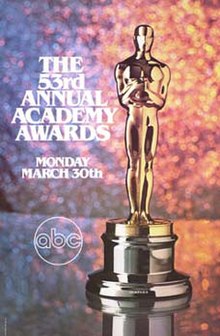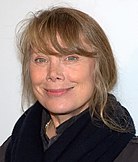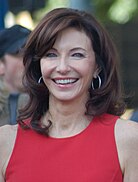Award ceremony for films of 1980
| 53rd Academy Awards | |
|---|---|
 Official poster with original date Official poster with original date | |
| Date | March 31, 1981 |
| Site | Dorothy Chandler Pavilion Los Angeles, California, U.S. |
| Hosted by | Johnny Carson |
| Produced by | Norman Jewison |
| Directed by | Marty Pasetta |
| Highlights | |
| Best Picture | Ordinary People |
| Most awards | Ordinary People (4) |
| Most nominations | The Elephant Man and Raging Bull (8) |
| TV in the United States | |
| Network | ABC |
| Duration | 3 hours, 10 minutes |
| Ratings | 39.9 million 31% (Nielsen ratings) |
| |
The 53rd Academy Awards ceremony, organized by the Academy of Motion Picture Arts and Sciences (AMPAS), honored films released in 1980 and took place on March 31, 1981, at the Dorothy Chandler Pavilion in Los Angeles, beginning at 7:00 p.m. PST / 10:00 p.m. EST. The ceremony was scheduled to take place originally on the previous day but was postponed due to the attempted assassination of Ronald Reagan. During the ceremony, AMPAS presented Academy Awards (commonly referred to as Oscars) in 20 categories. The ceremony, televised in the United States by ABC, was produced by Norman Jewison and directed by Marty Pasetta. Comedian and talk show host Johnny Carson hosted the show for the third consecutive time. Two weeks earlier, in a ceremony held at The Beverly Hilton in Beverly Hills, California, on March 15, the Academy Scientific and Technical Awards were presented by hosts Ed Asner and Fay Kanin.
Ordinary People won four awards, including Best Picture. Other winners included Tess with three awards, The Empire Strikes Back, Fame, Melvin and Howard, and Raging Bull with two, and Coal Miner's Daughter, The Dollar Bottom, The Fly, From Mao to Mozart: Isaac Stern in China, Karl Hess: Toward Liberty, and Moscow Does Not Believe in Tears with one. The telecast garnered 39.9 million viewers in the United States.
Winners and nominees
The nominees for the 53rd Academy Awards were announced on February 17, 1981, by Academy president Fay Kanin and actor William Devane. The Elephant Man and Raging Bull tied for the most nominations with eight each. The winners were announced at the awards ceremony on March 31. Best Director winner Robert Redford became the third individual to win this category for his directing debut and the first actor to achieve this feat. At age 20, Best Supporting Actor winner Timothy Hutton was the youngest male acting winner in Oscar history. Fame became the first film to earn two nominations for Best Original Song.
Awards
 Robert Redford, Best Director winner
Robert Redford, Best Director winner Robert De Niro, Best Actor winner
Robert De Niro, Best Actor winner Sissy Spacek, Best Actress winner
Sissy Spacek, Best Actress winner Timothy Hutton, Best Supporting Actor winner
Timothy Hutton, Best Supporting Actor winner Mary Steenburgen, Best Supporting Actress winner
Mary Steenburgen, Best Supporting Actress winner Bo Goldman, Best Screenplay Written Directly for the Screen winner
Bo Goldman, Best Screenplay Written Directly for the Screen winner Alvin Sargent, Best Screenplay Based on Material from Another Medium winner
Alvin Sargent, Best Screenplay Based on Material from Another Medium winner Vladimir Menshov, Best Foreign Language Film winner
Vladimir Menshov, Best Foreign Language Film winner Ferenc Rofusz, Best Animated Short Film winner
Ferenc Rofusz, Best Animated Short Film winner Thelma Schoonmaker, Best Film Editing winner
Thelma Schoonmaker, Best Film Editing winner
Winners are listed first, highlighted in boldface and indicated with a double dagger (‡).
Academy Honorary Award
- Henry Fonda – "In recognition of his brilliant accomplishments and enduring contribution to the art of motion pictures."
Special Achievement Award
- Brian Johnson, Richard Edlund, Dennis Muren and Bruce Nicholson for the visual effects of The Empire Strikes Back
Multiple nominations and awards
|
|
Presenters and performers
The following individuals, listed in order of appearance, presented awards or performed musical numbers:
Presenters
Performers
| Name | Role | Performed |
|---|---|---|
| Henry Mancini | Musical arranger Conductor |
Orchestral |
| Lucie Arnaz | Performer | "Hooray for Hollywood" |
| Willie Nelson | Performer | "On the Road Again" from Honeysuckle Rose |
| Irene Cara | Performer | "Fame" and "Out Here On My Own" from Fame |
| Dolly Parton | Performer | "9 to 5" from Nine to Five |
| Dionne Warwick | Performer | "People Alone" from The Competition |
| Academy Awards Orchestra | Performers | "Hooray for Hollywood(reprise)" (orchestral) during the closing credits |
Ceremony information

In December 1980, the Academy hired film producer Norman Jewison to produce the telecast for the first time. "I am delighted that the Academy will have the benefit of Norman Jewison's insight and creativity," said AMPAS President Fay Kanin in a press release announcing the selection. "He has always been able to bring a fresh approach into his work." That same month, it was announced that comedian and The Tonight Show host Johnny Carson would preside over emceeing duties for the 1981 ceremony. Jewison explained the decision to hire Carson, saying that the host was "an entertainment institution whose spontaneous wit and charm would add a great deal to the quality of the show."
Originally, the gala was scheduled to take place on March 30. However, due to the attempted assassination on US president Ronald Reagan which occurred earlier that day, Kanin, Jewison, and executives from broadcaster ABC announced that the festivities would be postponed to the following day. It marked the first time since the 40th ceremony held in 1968 that the ceremony was postponed from its original date. Furthermore, producers debated whether or not to televise a pre-recorded speech from Reagan, who was a former actor, saluting the nominees and the Academy. The segment, which was filmed nearly four weeks prior to the show, was eventually broadcast, with host Carson giving a preface explaining the decision to postpone the event.
The Fly acceptance speech
During the presentation of the award for Best Animated Short Film to The Fly, presenters Alan Arkin and Margot Kidder announced that the film's director, Ferenc Rofusz was unable to attend the ceremony. Just as they announced the Academy would accept the award on his behalf, an unnamed man later identified as Hungarofilm general manager Istvan Dosai came up on stage and accepted the award in lieu of the absent filmmaker. Marble Arch Films publicist Regina Gruss, who was in charge of hosting the Hungarian delegation at the Oscars, said that Rofusz contacted Dosai to accept the award on his behalf, but Academy officials asked him not to come up onstage unless his name was announced. After speaking to reporters and posing for pictures backstage, he never returned to his seat and left the ceremony immediately. According to Academy security chief Jerry Moon, AMPAS contacted the LAPD to issue a search warrant for Dosai for theft. However, Academy spokesperson Art Sarno denied that the organization had contacted the police and said that Dosai returned the statuette during a post-awards banquet.
Critical reviews
Some media outlets received the broadcast critically. Television columnist Tom Shales of The Washington Post commented, "Everything seemed an anticlimax to the Reagan opening, and the tragic events in Washington a day earlier did put a shadow of gloom over an affair that had promised to be grim enough anyway – since all but one of the year's Best Picture nominees were somber, austere films, and nothing to shout about." The Salt Lake Tribune television critic Harold Schindler wrote, "On the whole, the 53rd annual Academy Awards telecast Tuesday was overly long, expectedly dull and surprisingly lacking in those highlights which make Oscar night conversation." Bill Mandel of the San Francisco Examiner quipped, "After the real and completely unscripted emotional explosions of Monday, all the manipulated thrills of the movie industry seemed like the efforts of those bullfight clowns who distract the bull when the matador is injured."
Other media outlets received the broadcast more positively. Tampa Bay Times film critic Robert Alan Ross remarked, "The one-day delay turned out well. President Reagan's taped greeting – combined with emcee Johnny Carson's assurance that the First Couple were comfortably watching – instilled a happier mood than might otherwise have prevailed." Jerry Buck of the Associated Press quipped, "Producer Norman Jewison effectively chose to make the night a homage to motion pictures' past, making wide use of many cherished film clips that tugged at the heart and memory." The Boston Globe columnist Bruce McCabe wrote, "Given the trauma of the past few days, the Academy Awards show conducted itself rather well. No one really disgraced himself. There were no political speeches."
Ratings and reception
The American telecast on ABC drew in an average of 39.9 million people over the length of the entire ceremony, which was a 19% decrease from the previous year's ceremony. An estimated 75 million total viewers watched all or part of the awards. Moreover, the show drew lower Nielsen ratings compared to the previous ceremony, with 31% of households watching over a 58% share. Nevertheless, the ceremony presentation won an award for Outstanding Art Direction for a Variety Program (Roy Christopher) at the 33rd Primetime Emmys in September 1981.
See also
References
- "Ordinary People Wins Oscar for Best Movie". St. Louis Post-Dispatch. April 1, 1981. p. 9A.
- Wiley & Bona 1996, p. 592
- Osborne 2013, p. 413
- "Past Scientific & Technical Awards Ceremonies". Academy of Motion Picture Arts and Sciences. Archived from the original on February 13, 2014. Retrieved July 31, 2013.
- Harmetz, Aljean (April 1, 1981). "Ordinary People Wins the Academy Award for Best Picture". The New York Times. Archived from the original on February 27, 2022. Retrieved January 3, 2021.
- "Ordinary People Expected to Top Oscar Candidates". The Modesto Bee. February 17, 1981. p. C4.
- Harmetz, Aljean (February 18, 1981). "Elephant Man and Bull Up for 8 Oscars Each". The New York Times. Archived from the original on March 8, 2021. Retrieved February 3, 2021.
- Holden 1993, p. 328
- Kinn & Piazza 2002, p. 226
- Sackett 1995, p. 248
- "The 53rd Academy Awards (1981) Nominees and Winners". Academy of Motion Picture Arts and Sciences. Archived from the original on November 10, 2014. Retrieved October 7, 2011.
- "Academy Awards Acceptance Speech Database". Academy of Motion Picture Arts and Sciences. Archived from the original on June 15, 2022. Retrieved June 29, 2020.
- Franks 2005, p. 248
- Wiley & Bona 1996, p. 593
- Terrance 2013, p. 14
- "Norman Jewison to Produce 53rd Oscar Show". Academy of Motion Picture Arts and Sciences. December 1, 1980. Archived from the original on June 15, 2022. Retrieved June 5, 2020.
- Saltzman, Barbara (December 27, 1980). "Johnny, Norman, Marty, and Oscar". Los Angeles Times. p. 43.
- Lindsey, Robert (March 31, 1981). "Academy Awards Postponed to Tonight". The New York Times. Archived from the original on November 16, 2020. Retrieved March 25, 2021.
- Pollock, Dale (March 31, 1981). "Backstage at Oscars, Some Hard Decisions". Los Angeles Times. p. 28.
- Thomas, Bob (April 1, 1981). "Ordinary People Wins". The Spokesman-Review. p. A3.
- ^ "'Mystery Man' of Oscars Identified". Los Angeles Times. April 1, 1981. p. 7.
- "'Mystery Man' Had Approval". Sioux City Journal. April 2, 1981. p. A22.
- "It Was a Stand-In, Not a Phony, at Oscarcast". San Francisco Examiner. April 2, 1981. p. A19.
- Shales, Tom (April 1, 1981). "The Oscars". The Washington Post. Archived from the original on August 27, 2017. Retrieved September 21, 2020.
- Schindler, Harold (April 2, 1981). "TV Today: Oscar Show Lacked Usual Highlights". The Salt Lake Tribune. p. G11.
- Mandel, Bill (April 1, 1981). "The Big Broadcast of '81". San Francisco Examiner. p. E2.
- Ross, Robert Alan (April 3, 1981). "Academy Award Voters Reacted to Reality". St. Petersburg Times. p. 3D.
- Buck, Jerry (April 1, 1981). "Despite Assaination Attempt, Usual Pomp Accompanies Academy Awards". Santa Cruz Sentinel. p. 11.
- McCabe, Bruce (April 2, 1981). "The Celluloid Rite of Spring". The Boston Globe. p. 34.
- Abramowitz, Rachel (January 6, 2006). "Oscar's Choice". Los Angeles Times. Archived from the original on June 1, 2022. Retrieved February 3, 2021.
- Harris, Harry (April 3, 1981). "Original Saturday Night Crew to be on Ch. 48 Reruns". The Philadelphia Inquirer. p. 16-C.
- Boyer, Peter (April 7, 1981). "Oscar Show's Ratings are the Third Lowest". The Pantagraph. p. B5.
- "The 53rd Annual Academy Awards–Emmy Awards, Nominations and Wins". Academy of Television Arts and Sciences. Archived from the original on October 20, 2020. Retrieved November 14, 2020.
Bibliography
- Franks, Don (2005), Entertainment Awards: A Music, Cinema, Theatre and Broadcasting Guide, 1928 through 2003 (3rd ed.), Jefferson, North Carolina, United States: McFarland & Company, ISBN 978-1-5791-2396-3
- Holden, Anthony (1993), Behind the Oscar: The Secret History of the Academy Awards, New York, New York, United States: Simon & Schuster, ISBN 978-0-6717-0129-1
- Kinn, Gail; Piazza, Jim (2002), The Academy Awards: The Complete Unofficial History, New York, New York, United States: Workman Publishing Company, ISBN 978-1-5791-2396-3
- Osborne, Robert (2013). 85 Years of the Oscar: The Complete History of the Academy Awards. New York, New York, United States: Abbeville Publishing Group. ISBN 978-0-7892-1142-2. OCLC 856879222.
- Sackett, Susan (1995), Hollywood Sings!: An Inside Look at Sixty Years of Academy Award-Nominated Songs, New York, New York, United States: Billboard Books, ISBN 978-0-8230-7623-9
- Terrance, Vincent (2013). Television Specials: 5,336 Entertainment Programs, 1936–2012 (5 ed.). Jefferson, North Carolina, United States: Ballantine Books, McFarland & Company. ISBN 978-1-4766-1240-9. OCLC 844373010.
- Wiley, Mason; Bona, Damien (1996), Inside Oscar: The Unofficial History of the Academy Awards (5 ed.), New York, New York, United States: Ballantine Books, ISBN 978-0-3454-0053-6, OCLC 779680732
External links
- Academy Awards official website Archived March 4, 2009, at the Wayback Machine
- The Academy of Motion Picture Arts and Sciences official website Archived January 22, 2009, at the Wayback Machine
- Oscars' channel Archived October 2, 2018, at the Wayback Machine on YouTube run by the Academy of Motion Picture Arts and Sciences
- Analysis
- 1980 Academy Awards Winners and History Archived June 1, 2022, at the Wayback Machine Filmsite
- Other resources